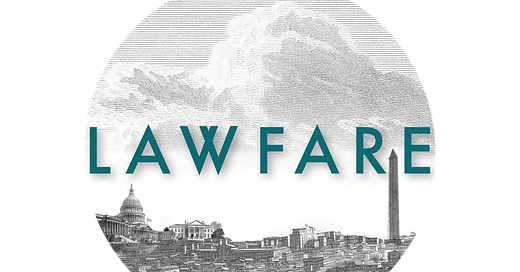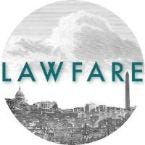Compiled by Caroline Cornett
Articles
Anna Bower reported on her months-long quest to identify the true administrator of the Department of Government Efficiency (DOGE). Bower examined contradictory statements by the administration about DOGE’s leadership, questions of constitutionality and authority under the Appointments Clause, court filings, and much more.
So, to review:
The executive order Trump signed on Jan. 20 created DOGE.
In that order, DOGE is defined as the U.S. DOGE service, a subcomponent of the U.S. DOGE Service, and the agency DOGE teams.
Musk’s lawyers say Musk is in charge of what the executive order created.
Trump says Musk is in charge of what the executive order created.
But the Solicitor General now claims that Musk is “not part of” what the executive order created.
Are We Ready for a ‘DeepSeek for Bioweapons’?
Steven Adler discussed the development of new artificial intelligence (AI) models such as Anthropic's Claude Opus 4, which has shown a dangerous level of capability related to bioweapons. Adler warned of the consequences of prioritizing speed over safety in AI research and called for regulation to mitigate the risks posed by dangerous AI technologies.
Anthropic’s announcement that their AI system has triggered this new risk level carries three important implications. First, Anthropic crossing this threshold suggests that many other AI developers will soon follow suit because the means of training such a system is accessible enough and well-understood. Second, other Western developers cannot be counted upon to take the same level of precautions as Anthropic did—either in testing or applying risk mitigations to their system—because, in the absence of federal or state safety mandates, society is relying on purely voluntary safety practices. Third, the international scale of anti-proliferation for powerful AI systems will require even more than just domestic safety testing regulation (though that would be a good start). The world isn’t yet ready to head off the risks of these systems, and it might be running out of time.
Personal Jurisdiction in Fuld v. PLO and U.S. v. PLO
Alexander Perkowski and Lulu Mansour summarized the arguments parties made before the Supreme Court in Fuld v. PLO and U.S. v. PLO, in which the Court considered whether a 2019 terrorism statute that brought the Palestine Liberation Organization (PLO) and Palestinian Authority (PA) under the personal jurisdiction of a district court violated the PLO and PA’s due process rights.
After a two-hour discussion, the justices seemed poised to reverse the Second Circuit’s earlier decision finding that the district court’s exercise of personal jurisdiction violated the PLO’s and the PA’s due process rights. It is unclear if the Court will decide the question of whether the Fifth Amendment imposes the same jurisdictional constraints on federal courts as the 14th Amendment does on state courts. While fairness and reasonableness concerns colored the liberal justices’ questions, conservatives on the Court seemed to question the judiciary’s role in deciding the constitutionality of a statute that presents a “Youngstown category 1 situation, where the president and Congress have acted together,” as Justice Brett Kavanaugh put it. That the political departments have acted in concert to achieve foreign policy and national security objectives pursuant to their respective constitutional authority to regulate respondents’ conduct—a pervasive theme throughout the argument—might indicate that the Court will issue an opinion on narrow grounds that allows the case to move forward in the lower court.
The Situation: They Just Can’t Help Themselves
Benjamin Wittes considered why the Trump administration continues to issue unlawful executive orders violating the First Amendment rights of law firms, universities, and more after experiencing numerous defeats in district courts. Wittes concluded that rather than any logical reason for its persistence, the administration simply cannot resist actions to bend institutions to Trump’s will.
So perhaps the idea was not to intimidate everyone but to intimate some institutions. Call it opportunistic intimidation. Sure, some law firms would fight—and win—but more would not fight, and their submission was the goal. And sure, some universities might fight, but others would not do so, and their submission was the goal as well. By bullying the ones that allowed themselves to be bullied, the administration creates a climate that affects other similarly-situated institutions.
But this turns out to be effective only in the short-term too. The reason is precedent. It’s comparatively easy to shake down a law firm when law firms are confronting a presidential level extortion scheme for the first time and don’t know what realistic recourse they might have.
Podcasts
Lawfare Daily: Minna Ålander on Finland, NATO, and the Russian Threat: Minna Ålander joined Anastasiia Lapatina to talk about Russia's buildup of military infrastructure along the Finnish border, potential scenarios of Russian aggression against the North Atlantic Treaty Organization (NATO), the critical role the United States plays in NATO's security framework, and more.
Lawfare Daily: Escalation, Episode Three: Us vs. Them: In the third episode of Escalation—Lawfare and Goat Rodeo’s limited series narrative podcast chronicling the surreal twists and turns in the U.S. and Ukraine’s relationship over the years—co-hosts Tyler McBrien and Lapatina covered the turn of the 21st century, during which Russia reverted back to its corrupt, authoritarian ways and the U.S. solely focused on terrorism after the Sept. 11 attacks.
Videos and Webinars
On Friday, May 30 at 4 p.m. ET, Wittes will sit down with Scott R. Anderson, Bower, and Roger Parloff to discuss the civil litigation targeting President Donald Trump’s executive actions, including orders finding that Trump’s tariffs are unlawful, the denial of Mahmoud Khalil’s motion for a preliminary injunction, the dismantling of independent agencies, and more. If you would like to be able to submit questions to the panelists and watch the livestream without ads, become a material supporter of Lawfare on Substack or Patreon. It will be livestreamed on YouTube for all other viewers. If you can’t attend the live event, the recording will be available immediately afterward on Lawfare’s YouTube channel.
Announcements
The Trials of the Trump Administration, our coverage of President Donald Trump’s executive actions and their legal challenges, has a new homepage. This page includes real-time analysis of the litigation, Lawfare's livestream series, documents related to Trump's actions, and a tracker of the legal challenges against them. Find the page here.
Lawfare’s work is only possible through the support of our readers. Support Lawfare through our ongoing Givebutter campaign!
Support Lawfare
Follow us on Twitter, Facebook, YouTube, and LinkedIn. Become a material supporter on Patreon and Substack or make a one-time tax-deductible contribution on Givebutter. Sign up to receive Lawfare in your inbox. Check out relevant job openings on our Job Board.




